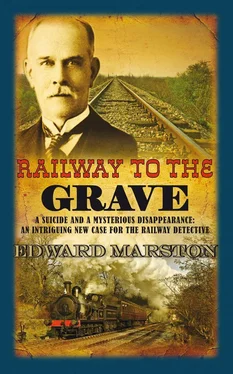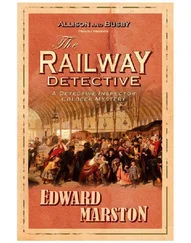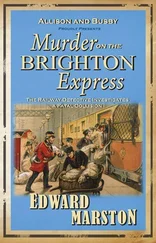Edward Marston - Railway to the Grave
Здесь есть возможность читать онлайн «Edward Marston - Railway to the Grave» весь текст электронной книги совершенно бесплатно (целиком полную версию без сокращений). В некоторых случаях можно слушать аудио, скачать через торрент в формате fb2 и присутствует краткое содержание. Жанр: Исторический детектив, на английском языке. Описание произведения, (предисловие) а так же отзывы посетителей доступны на портале библиотеки ЛибКат.
- Название:Railway to the Grave
- Автор:
- Жанр:
- Год:неизвестен
- ISBN:нет данных
- Рейтинг книги:5 / 5. Голосов: 1
-
Избранное:Добавить в избранное
- Отзывы:
-
Ваша оценка:
- 100
- 1
- 2
- 3
- 4
- 5
Railway to the Grave: краткое содержание, описание и аннотация
Предлагаем к чтению аннотацию, описание, краткое содержание или предисловие (зависит от того, что написал сам автор книги «Railway to the Grave»). Если вы не нашли необходимую информацию о книге — напишите в комментариях, мы постараемся отыскать её.
Railway to the Grave — читать онлайн бесплатно полную книгу (весь текст) целиком
Ниже представлен текст книги, разбитый по страницам. Система сохранения места последней прочитанной страницы, позволяет с удобством читать онлайн бесплатно книгу «Railway to the Grave», без необходимости каждый раз заново искать на чём Вы остановились. Поставьте закладку, и сможете в любой момент перейти на страницу, на которой закончили чтение.
Интервал:
Закладка:
‘It was my duty. He’d have expected it of me.’
‘Colonel Tarleton is dead. He’d never have known if you viewed his corpse or not.’
‘ I’d have known, Leeming. It would have made me feel guilty.’
‘Then it’s as well you went, sir,’ said Colbeck, quietly. ‘While you were away, we met Sergeant Hepworth, the railway policeman in charge of clearing the remains from the line. He’s very well informed about life in this little corner of the North Riding.’
‘What did he tell you?’
‘What didn’t he tell us?’ said Leeming, rolling his eyes. ‘The sergeant talked our ears off. Much of what we heard was irrelevant to our investigation but he did come up with one interesting notion.’
Tallis’s eyebrows lifted. ‘Oh? And what was that?’
‘He believes that Mrs Tarleton is still alive.’
‘That’s ridiculous!’
‘Well, we have no actual evidence of her death.’
‘There’s no other way to explain her disappearance, man,’ said Tallis, roused. ‘When a devoted wife goes missing for such a long period, she has to be the victim of foul play.’
‘Sergeant Hepworth doesn’t agree, sir.’
‘What, in God’s name, does he know about it?’
‘His daughter worked at the house,’ said Colbeck, ‘and was able to see at close quarters how the marriage operated. She came home with tales of dissension in the house – though I’m inclined to question the girl’s truthfulness. According to the girl who succeeded her, Ginny Hepworth was dismissed as maid-of-all-work because she was lazy, so she may well have an axe to grind.’
Tallis was impatient. ‘Come to the point, Colbeck.’
‘The girl alleges that the colonel and his wife were estranged.’
‘That’s absurd!’
‘She claims to have overheard arguments.’
‘Then she suffers from hallucinations.’
‘When were you last there, Superintendent?’ asked Colbeck. ‘When did you last visit them in their house?’
‘What difference does that make?’
‘Had you been there in the last year, for instance?’
‘Of course not,’ said Tallis, tetchily. ‘How could I spare time from my work to see friends who live so far away? Since I took over my present post, I’ve been slaving away at my desk seven days a week.’
‘That means you haven’t been here for over five years,’ Leeming calculated. ‘A lot can happen in that time, sir.’
‘The colonel and I kept up a regular correspondence.’
‘But I doubt if he’d have said much about his wife in his letters. He must have known that you hold peculiar views about marriage.’
‘My views are not peculiar,’ retorted Tallis, reddening. ‘They are based on observation. Marriage, in most cases, serves to emasculate a man and divert him from his true purpose in life. That was not the fate of Colonel Tarleton. His was a rare example of how marriage can help a husband to explore his true potential.’
‘My wife has done the same for me, sir.’
‘That’s a moot point, Leeming. What I see in you is a man whose attention is occasionally diverted by the demands of his family. Look to the inspector. Bachelors like Colbeck are far more effective upholders of the law. Now, will one of you please tell me exactly what this railway policeman is claiming, based on the dubious evidence of his daughter?’
‘In essence,’ said Colbeck, ‘his theory is this. Mrs Tarleton was alienated from her husband because she believed that he’d developed an interest in another woman. After a series of rows, she fled the house and – rather than admit the embarrassing truth – the colonel gave out that she had gone missing.’
‘That is preposterous!’ exploded Tallis.
‘It’s only a theory, sir.’
‘It’s a pack of damnable lies.’
‘The sergeant’s daughter did work there,’ Leeming reminded him. ‘And we do know that the colonel and his wife had separate bedrooms.’
‘That’s none of your business!’ howled Tallis.
Leeming cowered. ‘No, no, I agree, sir.’
‘Colonel Tarleton would no more look at another woman than he’d fly to the moon on the back of a brown cow. He observed his marriage vows to the letter. He’d never bestow his affections on another woman. To start with, he’d never let her anywhere near him.’
‘He did in this instance,’ said Leeming. ‘She worked there.’
Tallis was open-mouthed in astonishment. ‘Mrs Withers?’
‘They spent all their time under the same roof, sir.’
‘Good God, man! Have you taken leave of your senses? Mrs Withers is a servant. Colonel Tarleton would never dream of even looking at her in the way you imply. She’s beneath him. I’ll hear no more of this nonsense,’ he went on, getting to his feet and picking up his glass. ‘I’m going to bed.’
‘Aren’t you hungry, sir?’ asked Colbeck.
‘I couldn’t touch a thing – especially after listening to the arrant nonsense that you’ve just told me. Colonel Tarleton loved his wife dearly. I’ll trouble you to remember that from now on.’
After taking a long sip of his brandy, he stalked off. Colbeck was relieved that there were so few people there to witness Tallis’s volcanic loss of temper and he regretted passing on Hepworth’s theory about the missing wife. Something else worried him.
‘This case is arousing too many emotions in him,’ he observed. ‘I think his personal involvement is a handicap to his judgement. He has an image of the perfect marriage that existed when he was last here a number of years ago. Since then, a great deal has happened. To begin with, the size of the domestic staff at the house has been reduced and the garden is no longer maintained to such a high standard. Something very serious must have happened yet there seems to have been no hint of it in the letters sent from here to the superintendent.’
‘What do you think we should do?’
‘Persuade him to leave the investigation to us.’
‘It will not be easy.’
‘I realise that, Victor.’
‘I wouldn’t fancy going anywhere near him when he’s in this state. What about you, Inspector? Why don’t you go up to his room this minute to put the idea to him?’
‘I’m not that brave,’ said Colbeck with a grin, ‘or that foolhardy.’
‘Go on,’ teased Leeming. ‘You can mention your engagement while you’re up there. He’s in the ideal mood to talk about marriage.’
Happy by nature, Madeleine Andrews now took even more pleasure out of each day. The moment she woke up, she rolled over in bed to look at the engagement ring that stood in its open box on the bedside table. It symbolised her delight. She’d met Robert Colbeck under difficult circumstances when her father had been badly injured during the robbery of a train he was driving. What had begun as a chance meeting had slowly matured into a friendship before developing into something far deeper. Yet she’d never really believed that it would lead to holy matrimony. Given the difference in their social positions, she’d never dared to think that she’d be an acceptable wife for him.
Colbeck, however, had seen her true qualities. In his view, Madeleine was much more than merely the daughter of a widowed engine driver. She was a beautiful, intelligent, resourceful young woman who’d given crucial help during some of his investigations. Apart from reading voraciously the books she’d borrowed from his extensive library, Madeleine had also developed her artistic talents to the point where she could sell her work. Colbeck’s encouragement had been decisive and, unlike most people, he didn’t think that her subject matter was unfeminine. Because she celebrated railways to such startling effect in her paintings, he’d found one more reason to love her. Over breakfast that morning, her father was curious.
Читать дальшеИнтервал:
Закладка:
Похожие книги на «Railway to the Grave»
Представляем Вашему вниманию похожие книги на «Railway to the Grave» списком для выбора. Мы отобрали схожую по названию и смыслу литературу в надежде предоставить читателям больше вариантов отыскать новые, интересные, ещё непрочитанные произведения.
Обсуждение, отзывы о книге «Railway to the Grave» и просто собственные мнения читателей. Оставьте ваши комментарии, напишите, что Вы думаете о произведении, его смысле или главных героях. Укажите что конкретно понравилось, а что нет, и почему Вы так считаете.












